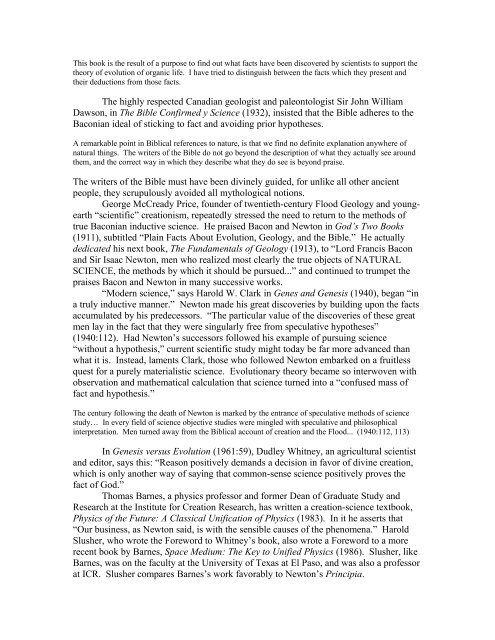Creationism - National Center for Science Education
Creationism - National Center for Science Education
Creationism - National Center for Science Education
You also want an ePaper? Increase the reach of your titles
YUMPU automatically turns print PDFs into web optimized ePapers that Google loves.
This book is the result of a purpose to find out what facts have been discovered by scientists to support the<br />
theory of evolution of organic life. I have tried to distinguish between the facts which they present and<br />
their deductions from those facts.<br />
The highly respected Canadian geologist and paleontologist Sir John William<br />
Dawson, in The Bible Confirmed y <strong>Science</strong> (1932), insisted that the Bible adheres to the<br />
Baconian ideal of sticking to fact and avoiding prior hypotheses.<br />
A remarkable point in Biblical references to nature, is that we find no definite explanation anywhere of<br />
natural things. The writers of the Bible do not go beyond the description of what they actually see around<br />
them, and the correct way in which they describe what they do see is beyond praise.<br />
The writers of the Bible must have been divinely guided, <strong>for</strong> unlike all other ancient<br />
people, they scrupulously avoided all mythological notions.<br />
George McCready Price, founder of twentieth-century Flood Geology and youngearth<br />
“scientific” creationism, repeatedly stressed the need to return to the methods of<br />
true Baconian inductive science. He praised Bacon and Newton in God’s Two Books<br />
(1911), subtitled “Plain Facts About Evolution, Geology, and the Bible.” He actually<br />
dedicated his next book, The Fundamentals of Geology (1913), to “Lord Francis Bacon<br />
and Sir Isaac Newton, men who realized most clearly the true objects of NATURAL<br />
SCIENCE, the methods by which it should be pursued...” and continued to trumpet the<br />
praises Bacon and Newton in many successive works.<br />
“Modern science,” says Harold W. Clark in Genes and Genesis (1940), began “in<br />
a truly inductive manner.” Newton made his great discoveries by building upon the facts<br />
accumulated by his predecessors. “The particular value of the discoveries of these great<br />
men lay in the fact that they were singularly free from speculative hypotheses”<br />
(1940:112). Had Newton’s successors followed his example of pursuing science<br />
“without a hypothesis,” current scientific study might today be far more advanced than<br />
what it is. Instead, laments Clark, those who followed Newton embarked on a fruitless<br />
quest <strong>for</strong> a purely materialistic science. Evolutionary theory became so interwoven with<br />
observation and mathematical calculation that science turned into a “confused mass of<br />
fact and hypothesis.”<br />
The century following the death of Newton is marked by the entrance of speculative methods of science<br />
study… In every field of science objective studies were mingled with speculative and philosophical<br />
interpretation. Men turned away from the Biblical account of creation and the Flood... (1940:112, 113)<br />
In Genesis versus Evolution (1961:59), Dudley Whitney, an agricultural scientist<br />
and editor, says this: “Reason positively demands a decision in favor of divine creation,<br />
which is only another way of saying that common-sense science positively proves the<br />
fact of God.”<br />
Thomas Barnes, a physics professor and <strong>for</strong>mer Dean of Graduate Study and<br />
Research at the Institute <strong>for</strong> Creation Research, has written a creation-science textbook,<br />
Physics of the Future: A Classical Unification of Physics (1983). In it he asserts that<br />
“Our business, as Newton said, is with the sensible causes of the phenomena.” Harold<br />
Slusher, who wrote the Foreword to Whitney’s book, also wrote a Foreword to a more<br />
recent book by Barnes, Space Medium: The Key to Unified Physics (1986). Slusher, like<br />
Barnes, was on the faculty at the University of Texas at El Paso, and was also a professor<br />
at ICR. Slusher compares Barnes’s work favorably to Newton’s Principia.

















